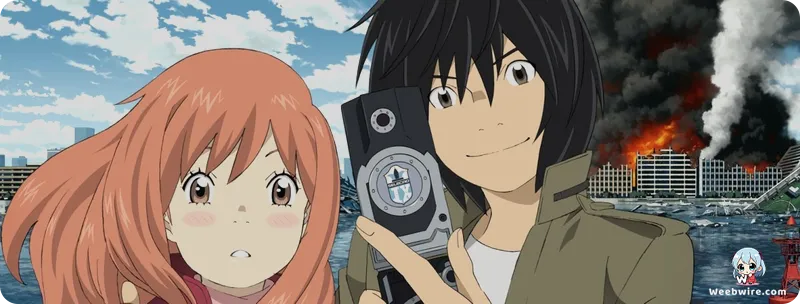Unlocking Eden: The Profound Narrative and Creative Brilliance Behind 'Paradise Lost'

Prepare to re-enter the enigmatic world of Eden of the East as we unravel the profound intricacies and behind-the-scenes genius that culminated in its cinematic masterpiece, Eden of the East the Movie II: Paradise Lost. Far more than a mere sequel, this film served as the breathtaking finale to a series renowned for its complex narrative, bringing the high-stakes Seleção game and the very fate of Japan to a definitive, thought-provoking close. It is a masterclass in narrative resolution, seamlessly weaving together threads of grand conspiracy, sharp social commentary, and deeply personal character journeys that have captivated audiences worldwide.
The Audacious Premise: A Game of Salvation
At the heart of Eden of the East lies its audacious premise: a clandestine game orchestrated by the mysterious 'Air King'. Thirteen individuals, known as the Seleção, are each granted a staggering ten billion yen and the guidance of a powerful AI concierge, Juiz, with a singular, enigmatic mission: 'to save Japan'. The chilling twist? Misuse of funds or failure to achieve their goal results in immediate, ruthless elimination by a shadowy 'Supporter'. What truly elevates this concept is the profound moral ambiguity it presents. The series deliberately refrains from defining 'saving Japan', inviting viewers to ponder the diverse, often contradictory, approaches taken by the Seleção members, forcing a nuanced exploration of leadership, ethics, and collective responsibility.
Akira Takizawa: The Enigmatic Protagonist
Central to this thrilling odyssey is Akira Takizawa, a protagonist shrouded in mystery. Discovered naked outside the White House, suffering from amnesia, and armed only with a gun and an advanced mobile phone, Akira's journey begins amidst bewildering circumstances. A pivotal revelation unveils his true identity as Seleção No. 09, a previous winner who deliberately chose to wipe his own memory and reset his conditions. This self-imposed amnesia is not just a clever plot device; it is a profound exploration of redemption, the weight of past actions, and the quest for a fresh perspective. Akira's unconventional methods of 'saving Japan' often manifest as seemingly random acts of kindness, which, upon deeper inspection, reveal a remarkable understanding of human nature and societal needs.

Saki Morimi: The Unwavering Moral Compass
Alongside Akira is Saki Morimi, a young woman who inadvertently becomes an indispensable part of his bizarre reality. Saki's role is often underestimated but crucial. Far from a typical damsel in distress, she evolves into Akira's unwavering moral compass, his anchor to reality, and ultimately, a key player in decrypting the Seleção mystery. Her immediate trust in a bewildered stranger speaks volumes about her inherent compassion. As the narrative unfolds, Saki sheds her initial naivete, transforming into a resourceful and determined individual. She actively contributes to Akira's quest, leveraging her unique skills and connections, particularly within the enigmatic NEET collective, 'Eden of the East'. Her transformation from an ordinary college student to a pivotal figure underscores the extraordinary power latent within everyday individuals to ignite change.
The 'Eden of the East' Collective: Challenging Stereotypes
The 'Eden of the East' collective itself offers a remarkably positive and unexpected portrayal of a group frequently stigmatized in Japanese society. These highly intelligent, socially withdrawn individuals have forged a powerful, self-sustaining network. Their unparalleled ability to gather and process information, coupled with their unique problem-solving skills, renders them an invaluable asset to Akira's mission. This depiction boldly challenges common stereotypes, asserting that societal contributions can emerge from the most unexpected corners. The series provocatively suggests that perhaps those who have consciously opted out of conventional society might possess the clearest lens through which to view its failings and conceptualize its most innovative solutions.
The Visionary Behind the Narrative: Kenji Kamiyama
Guiding this intricate narrative is the visionary mind of Kenji Kamiyama, celebrated for his work on critically acclaimed series like Ghost in the Shell: Stand Alone Complex. Kamiyama's distinctive style, marked by profound philosophical themes, meticulous world-building, and incisive social commentary, permeates every frame of Eden of the East. He fearlessly tackles complex contemporary issues such as economic stagnation, political corruption, and the erosion of individual agency. His deliberate decision to conclude the saga with two films, The King of Eden and Paradise Lost, rather than merely extending the TV series, granted the narrative a grander cinematic scope and a more impactful, definitive resolution to the Seleção game, offering a deeply satisfying yet still thought-provoking conclusion to Akira and Saki's journey. This strategic choice emphatically underscores the ambitious vision behind the project.
Distinctive Artistry: Chika Umino's Character Designs
Adding another layer of distinctive artistry are the character designs by Chika Umino, renowned for her beloved works Honey and Clover and March Comes in Like a Lion. Umino's signature art style, typically associated with heartwarming slice-of-life and romantic dramas, imbues the characters with a surprising warmth and relatability. This creates a compelling visual contrast with the dark, high-stakes thriller plot. This unique fusion of her charming, expressive designs with Kamiyama's intricate, suspenseful narrative forges an aesthetic that truly sets Eden of the East apart from other psychological thrillers. It grounds the fantastical elements in a profound sense of human authenticity, making the characters' struggles and triumphs resonate all the more deeply with the audience.
The Enduring Message of Paradise Lost
Eden of the East the Movie II: Paradise Lost transcends mere plot resolution. It delves profoundly into the deeper implications of the 'Air King's' grand design and unveils the true nature of the 'Supporters' and the elusive Juiz. The film masterfully explores the concept of collective responsibility and challenges the inherent flaws in placing the burden of salvation on a singular figure. Ultimately, it posits that the future of a nation, or indeed humanity itself, hinges not on the shoulders of one chosen individual, but on the collaborative efforts, inherent goodness, and collective ingenuity of many. This powerful message, subtly yet profoundly woven throughout the intricate plot twists and revelations, stands as perhaps the most enduring 'fun fact' about the series: its unwavering belief in the extraordinary potential of ordinary people to forge transformative change. It is a series that demands re-watching, not just for its gripping mystery, but for the profound questions it continues to provoke long after the final credits roll.
Credits
Eden of the East
Author
Kenji Kamiyama
Cover Art
Chika Umino
Studio
Production I.G
Publisher
Production I.G
Producers





